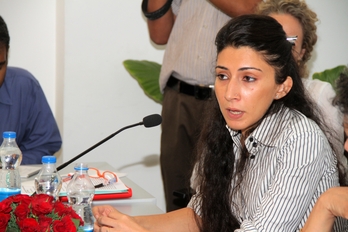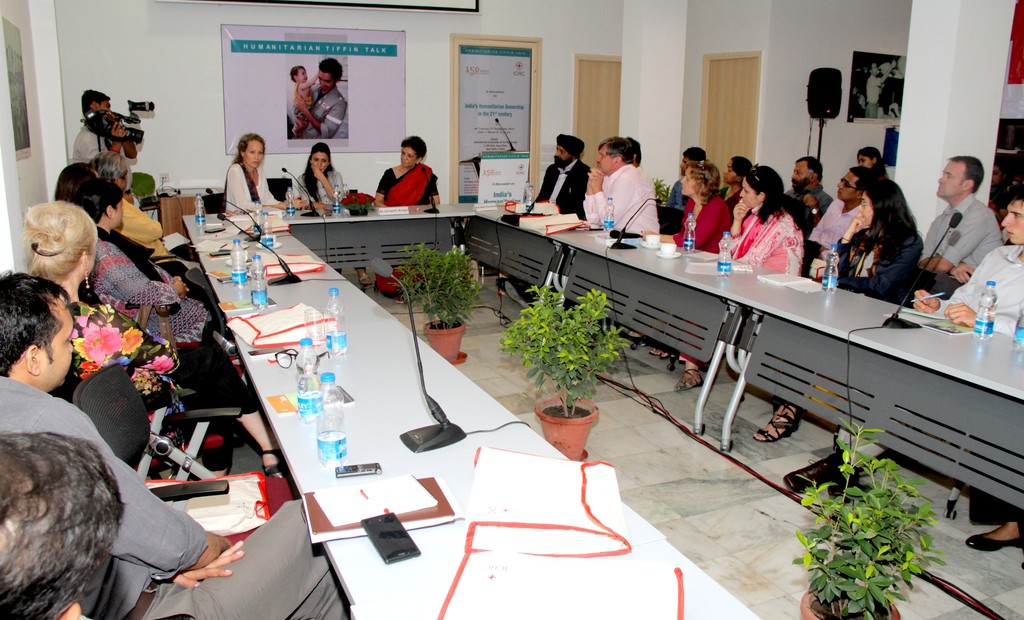On Tuesday (2 September), the ICRC regional delegation in New Delhi took time off its hectic schedule to have a special tête–à–tête followed by lunch with its friends — Red Cross Movement partners, academics, journalists and other actors in the humanitarian field.
It was a red letter day for the delegation as we hosted the first Humanitarian Tiffin Talk, also the first event to be held at the delegation’s new office in the Hauz Khas area of the Capital. With this, we set the ball rolling for a series of informal discussions that we hope will be appropriated and taken forward by the participants and other interested individuals and actors in the domain.
Introducing Tiffin Talk, Ms Mary Werntz, head of the ICRC delegation in New Delhi for India, Bhutan and the Maldives, reminisced about one of her previous missions in the ICRC when eclectic groups — university professors, think tankers, ICRC staff members — would have informal conversations in what they called ‘humanitarian salons’ — someone’s living room, a classroom or a small conference hall. “The group did not belong to any one organisation; the agenda not set by any one person instead the participants themselves. But it always took on a humanitarian topic… it offered a moment of reflection across organisations and institutions, a moment to deliberate together about our work, its challenges, its contradictions,” said Ms Werntz.
Tuesday’s talk was an attempt to talk humanitarianism, not from an entirely western paradigm, but from an Indian perspective. India, from being an aid recipient, is fast changing its credentials into a donor nation. The Economist made a pointed observation about India’s transformation into a donor country, detailing how India proposes to disburse almost USD 11 billion in aid over the next five years. Foreign aid projects managed by the Ministry of External Affairs (MEA) more than doubled from USD 300 million in 2007 to over USD 700 million in 2012.

Dr Urvashi Aneja spoke about India’s emerging role as a humanitarian donor in the 21st century. ©ICRC/Ashish Bhatia
The event, which was held from 11am to 12.30pm, featured an enlightening talk by Dr Urvashi Aneja, associate professor of international relations and director of the Centre for Global Governance and Policy at the Jindal School of International Affairs, OP Jindal Global University in Haryana. Professor Neera Chandhoke, national fellow at the Indian Council of Social Science Research, played the gracious chairperson and congratulated the ICRC on the Tiffin Talk initiative. Surinder Singh Oberoi, the political and communications adviser of ICRC New Delhi, while welcoming the guests, asked the speaker to expound on what Western humanitarianism means to India, and whether India is ready to step into a responsible, accountable role in the field.
Dr Aneja spoke on the history of India’s development assistance; India’s humanitarian assistance; the drivers of Indian foreign policy and how this translates into India’s understanding of humanitarianism and its implications for India as a donor in the 21st century. “The aim is not merely to find avenues through which the international system can better engage with India, but also try to consider India’s understanding of humanitarianism on its own terms,” said Dr Aneja, adding that India’s overseas development programmes are demand-driven and untied, based on principles of partnership and mutual benefit.
The talk was followed by a question-and-answer session open to the audience in which Dr Aneja fielded questions ranging from the motivation behind India’s humanitarian aid policy to what could be the way forward for India, especially in South Asia.
Ms Werntz thanked the participants for joining in the talk and welcomed them to take the initiative forward. “The idea is to meet regularly, and informally, sometimes here, sometimes at a university, sometimes at a home. ICRC does not intend to be the organiser each time. We hope that others will bring in new ideas, new speakers, new locations. We hope that today’s discussion helps set the momentum for us to meet regularly, several times each year under the banner of Humanitarian Tiffin Talk. We hope that we can collectively develop a platform for sharing of ideas on the humanitarian endeavour and 21st century humanitarianism,” said Ms Werntz.
She also announced that before the end of the year the ICRC would host another talk, this time by Dr Anne Hammerstad, a doctorate from the London School of Economics and Oxon, author of two books and a researcher on climate and migration.
Click here for the event announcement posted on the ICRC New Delhi Blog.
The Presentation
Q&A Session
Follow the series on twitter.com/ICRC_nd under the hashtag #TiffinTalk.
ICRC New Delhi


